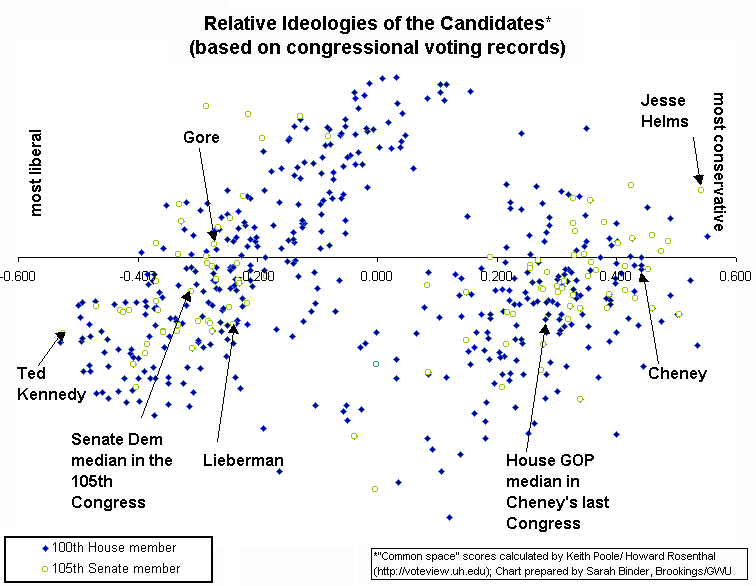The choice of vice-presidential running mates by Governor George W. Bush and Vice President Al Gore has unleashed a blizzard of commentary: How conservative is Dick Cheney? Is Joe Lieberman more the ideological soulmate of George Bush than Al Gore? Reporters and political operatives have combed the congressional voting records of Cheney and Lieberman, and offered examples of individual votes to bolster their arguments. While this is a perfectly legitimate and informative exercise, we offer here a broader measure of the ideological leanings of Cheney, Gore and Lieberman, based on the roll call votes cast during their entire careers in the House and/or Senate.
In the figure below, we place Cheney, Gore and Lieberman along the conventional liberal-conservative (left-right) spectrum, using career ideological scores based on legislators’ voting records developed by two political scientists (Keith Poole of the University of Houston and Howard Rosenthal of Princeton).
For perspective, we show the ideological orientations of House members in Cheney’s last House term (1987-88) and Senate members in 1997-98, as well as the ideological positions of Senators Edward Kennedy (far left) and Jesse Helms (far right). Gore’s ideological position is based on the votes he cast during his House and Senate careers. The set of Poole and Rosenthal scores used here is based on legislators’ non-unanimous roll call votes and assumes that legislators do not shift ideologically over the course of their careers in Congress.
If there was “not a dime’s worth of difference” between the two parties, we would expect to find the typical Republican and Democratic members located in close proximity along the liberal-conservative spectrum. In fact, the two parties’ central tendencies are quite distant from each other, with relatively few legislators occupying the political center. Neither is the new wisdom about Lieberman’s policy views quite right. If Lieberman was closer to the Republican presidential candidate, George Bush, than to the Democratic candidate, Al Gore, we would expect him to be much further to the right along the left-right spectrum. In fact, his voting record is quite similar to Gore’s, and both are ideologically just to the right of the typical Democrat. In contrast, the received wisdom about Cheney is right on the mark. His congressional voting record reveals him to be far more conservative than the typical House Republican of the late 1980s, with just eleven GOP colleagues to his right.
Of course, Cheney’s last votes in the House were cast almost a dozen years ago, and Al Gore’s congressional voting record effectively ended eight years ago. Time passes, context changes, and issues evolve. While amassing these voting records, all three of them represented constituencies much smaller than the nation they would represent if elected in November. We make no claim that these roll call histories perfectly represent what they now believe or what they would advocate in a Republican or Democratic administration. And they reveal nothing about their legislative styles or ability to work effectively with members of both parties. Nonetheless, we offer these data in hopes of providing a useful corrective or supplement to the current debate.

The Brookings Institution is committed to quality, independence, and impact.
We are supported by a diverse array of funders. In line with our values and policies, each Brookings publication represents the sole views of its author(s).



Commentary
Op-edBush and Lieberman: Two Pols in an Ideological Pod?
August 10, 2000